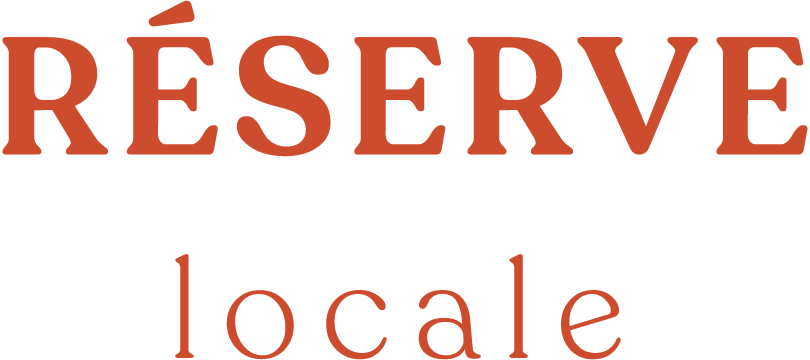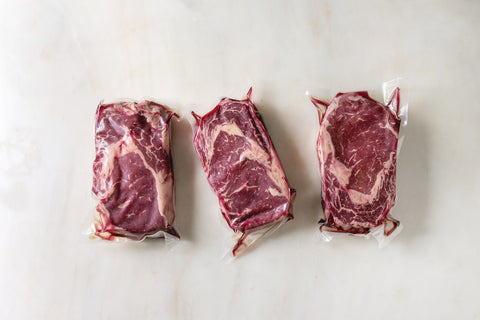“Grass-fed”, “grassfed”, “pastured” beef… New names for beef are entering the market and it’s not for nothing. The environmental impact of the meat on our plate has led Quebecers to question the farming practices of beef, this animal which emits much more carbon than other animals, such as pork or chicken. However, more and more studies lead us to believe that the problem is not so simple... Is popular discourse lacking nuance? This is what several scientists, agronomists and producers are trying to demystify.
Without growth hormones or antibiotics
In conventional breeding, cattle are fed grain (corn, soy, wheat, etc.) for a good part of their lives. This allows accelerated growth of the animals and allows them to fatten up quickly, which results in meat richer in fat.
However, oxen are designed to digest grass and not grain. When we feed them grain, we do not respect the nutritional needs of these animals. Since these needs are not met, they must be given growth hormones so that they grow quickly despite their inadequate food. In addition, this diet not designed for their biology weakens their immune system and therefore requires injecting them with doses of antibiotics to avoid illness.
Grass-fed meat is often meat without growth hormones or antibiotics. In unconventional breeding, oxen can move freely in large green spaces, can eat a natural diet and grow at a normal rate. This is why they generally have fewer health problems than conventionally raised animals. Indeed, a Quebec study shows that cows that are never sent to pasture suffer more health problems and have a higher mortality rate than cows that go to pasture (Vaillancourt, 2021). Healthier beef produces healthier meat.
More nutritious meat
Indeed, health-wise, grass-fed beef is much more nutritious and beneficial for our health. This type of meat is lower in fat and has up to four times more omega-3 and vitamin E than grain-fed beef. Omega-3s are good anti-inflammatory fats called “essential”, which means that our body cannot make them itself. We must therefore look for them through our diet. Conventionally raised beef instead contains high levels of omega-6. Even though they are pro-inflammatory, omega-6 is not inherently bad. Rather, it is the ratio of omega 6 and omega 3 that causes a problem. A balanced ratio of omega-3 and omega 6 fatty acids in the body is important for our health. Having a high level of omega-6 and a low level of omega-3, conventionally farmed meat does not provide this balance.
Helps reduce GHGs
Grass-fed beef sequesters CO2 in the soil and thus reduces greenhouse gas emissions. Indeed, a study carried out by a specialist in sustainable agriculture shows that there is a correlation between the number of animals and carbon sequestration. In Canada, a cattle produces on average 2,200 kilograms of GHG per year in the form of methane. It is estimated that grazing cattle produce 800, because they sequester 1,400 kilograms in the soil (Meneu, 2021). By grazing on grass, grazing animals allow the soil to store carbon and accelerate its regeneration process. If you would like to learn more about the role of grazing for the environment, you can read our blog post on regenerative agriculture.
In short, grass-fed beef is not only beneficial for the health of human beings, it is also good for the environment and for the beef itself. Unconventionally raised cattle are well treated from start to finish and are allowed to live freely and feed naturally. Healthy beef allows us to obtain meat that is nutritious and beneficial to our diet. Beyond nutritional value, many people prefer the taste of grass-fed beef. But it’s mainly how you prepare it that makes all the difference! You can check out how to prepare grass-fed beef for our tips.
Convinced? We let you look at our grass-fed beef products
Sources used for writing this article:
Meneu, G. (September 29, 2021). Grass-Fed Beef, Really Eco-Friendly? Radio-Canada. https://ici.radio canada.ca/nouvelle/1827716/burger-boeuf-nourri-herbe-aw-nature-environnement .
NORSAN. (2021). Are omega-6 bad for your health?. NORSAN. https://www.norsan.fr/les-omega-6-sont-ils-mauvais-pour-la-sante/
Vaillancourt, J. (February 27, 2021). Returning cows to pasture would be beneficial for their health. Radio-Canada. https://ici.radio-canada.ca/nouvelle/1773028/animals-vaches-pasture-sante






Comments (0)
There are no comments for this article. Be the first to leave a message !